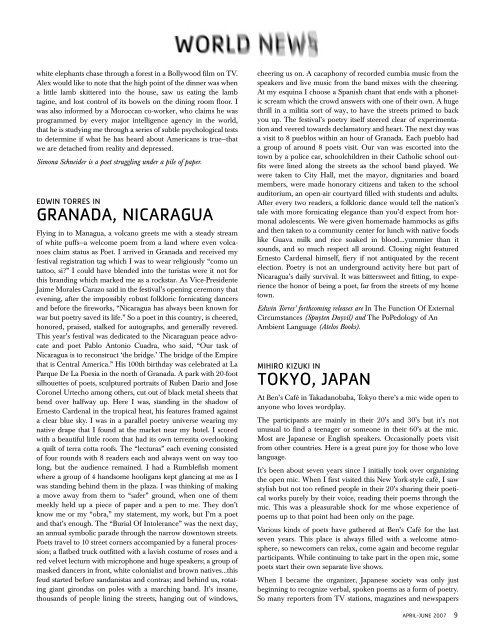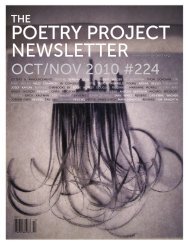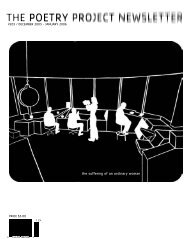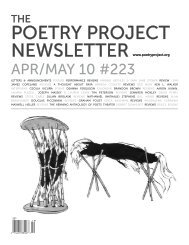You also want an ePaper? Increase the reach of your titles
YUMPU automatically turns print PDFs into web optimized ePapers that Google loves.
white elephants chase through a forest in a Bollywood film on TV.<br />
Alex would like to note that the high point of the dinner was when<br />
a little lamb skittered into the house, saw us eating the lamb<br />
tagine, and lost control of its bowels on the dining room floor. I<br />
was also informed by a Moroccan co-worker, who claims he was<br />
programmed by every major intelligence agency in the world,<br />
that he is studying me through a series of subtle psychological tests<br />
to determine if what he has heard about Americans is true—that<br />
we are detached from reality and depressed.<br />
Simona Schneider is a poet struggling under a pile of paper.<br />
EDWIN TORRES IN<br />
GRANADA, NICARAGUA<br />
Flying in to Managua, a volcano greets me with a steady stream<br />
of white puffs—a welcome poem from a land where even volcanoes<br />
claim status as Poet. I arrived in Granada and received my<br />
festival registration tag which I was to wear religiously “como un<br />
tattoo, si” I could have blended into the turistas were it not for<br />
this branding which marked me as a rockstar. As Vice-Presidente<br />
Jaime Morales Carazo said in the festival’s opening ceremony that<br />
evening, after the impossibly robust folkloric fornicating dancers<br />
and before the fireworks, “Nicaragua has always been known for<br />
war but poetry saved its life.” So a poet in this country, is cheered,<br />
honored, praised, stalked for autographs, and generally revered.<br />
This year’s festival was dedicated to the Nicaraguan peace advocate<br />
and poet Pablo Antonio Cuadra, who said, “Our task of<br />
Nicaragua is to reconstruct ‘the bridge.’ <strong>The</strong> bridge of the Empire<br />
that is Central America.” His 100th birthday was celebrated at La<br />
Parque De La Poesia in the north of Granada. A park with 20-foot<br />
silhouettes of poets, sculptured portraits of Ruben Dario and Jose<br />
Coronel Urtecho among others, cut out of black metal sheets that<br />
bend over halfway up. Here I was, standing in the shadow of<br />
Ernesto Cardenal in the tropical heat, his features framed against<br />
a clear blue sky. I was in a parallel poetry universe wearing my<br />
native drape that I found at the market near my hotel. I scored<br />
with a beautiful little room that had its own terrezita overlooking<br />
a quilt of terra cotta roofs. <strong>The</strong> “lecturas” each evening consisted<br />
of four rounds with 8 readers each and always went on way too<br />
long, but the audience remained. I had a Rumblefish moment<br />
where a group of 4 handsome hooligans kept glancing at me as I<br />
was standing behind them in the plaza. I was thinking of making<br />
a move away from them to “safer” ground, when one of them<br />
meekly held up a piece of paper and a pen to me. <strong>The</strong>y don’t<br />
know me or my “obra,” my statement, my work, but I’m a poet<br />
and that’s enough. <strong>The</strong> “Burial Of Intolerance” was the next day,<br />
an annual symbolic parade through the narrow downtown streets.<br />
Poets travel to 10 street corners accompanied by a funeral procession;<br />
a flatbed truck outfitted with a lavish costume of roses and a<br />
red velvet lecturn with microphone and huge speakers; a group of<br />
masked dancers in front, white colonialist and brown natives...this<br />
feud started before sandanistas and contras; and behind us, rotating<br />
giant girondas on poles with a marching band. It’s insane,<br />
thousands of people lining the streets, hanging out of windows,<br />
cheering us on. A cacaphony of recorded cumbia music from the<br />
speakers and live music from the band mixes with the cheering.<br />
At my esquina I choose a Spanish chant that ends with a phonetic<br />
scream which the crowd answers with one of their own. A huge<br />
thrill in a militia sort of way, to have the streets primed to back<br />
you up. <strong>The</strong> festival’s poetry itself steered clear of experimentation<br />
and veered towards declamatory and heart. <strong>The</strong> next day was<br />
a visit to 8 pueblos within an hour of Granada. Each pueblo had<br />
a group of around 8 poets visit. Our van was escorted into the<br />
town by a police car, schoolchildren in their Catholic school outfits<br />
were lined along the streets as the school band played. We<br />
were taken to City Hall, met the mayor, dignitaries and board<br />
members, were made honorary citizens and taken to the school<br />
auditorium, an open-air courtyard filled with students and adults.<br />
After every two readers, a folkloric dance would tell the nation’s<br />
tale with more fornicating elegance than you’d expect from hormonal<br />
adolescents. We were given homemade hammocks as gifts<br />
and then taken to a community center for lunch with native foods<br />
like Guava milk and rice soaked in blood...yummier than it<br />
sounds, and so much respect all around. Closing night featured<br />
Ernesto Cardenal himself, fiery if not antiquated by the recent<br />
election. <strong>Poetry</strong> is not an underground activity here but part of<br />
Nicaragua’s daily survival. It was bittersweet and fitting, to experience<br />
the honor of being a poet, far from the streets of my home<br />
town.<br />
Edwin Torres’ forthcoming releases are In <strong>The</strong> Function Of External<br />
Circumstances (Spuyten Duyvil) and <strong>The</strong> PoPedology of An<br />
Ambient Language (Atelos Books).<br />
MIHIRO KIZUKI IN<br />
TOKYO, JAPAN<br />
At Ben’s Café in Takadanobaba, Tokyo there’s a mic wide open to<br />
anyone who loves wordplay.<br />
<strong>The</strong> participants are mainly in their 20’s and 30’s but it’s not<br />
unusual to find a teenager or someone in their 60’s at the mic.<br />
Most are Japanese or English speakers. Occasionally poets visit<br />
from other countries. Here is a great pure joy for those who love<br />
language.<br />
It’s been about seven years since I initially took over organizing<br />
the open mic. When I first visited this New York-style café, I saw<br />
stylish but not too refined people in their 20’s sharing their poetical<br />
works purely by their voice, reading their poems through the<br />
mic. This was a pleasurable shock for me whose experience of<br />
poems up to that point had been only on the page.<br />
Various kinds of poets have gathered at Ben’s Café for the last<br />
seven years. This place is always filled with a welcome atmosphere,<br />
so newcomers can relax, come again and become regular<br />
participants. While continuing to take part in the open mic, some<br />
poets start their own separate live shows.<br />
When I became the organizer, Japanese society was only just<br />
beginning to recognize verbal, spoken poems as a form of poetry.<br />
So many reporters from TV stations, magazines and newspapers<br />
APRIL-JUNE 2007 9
















